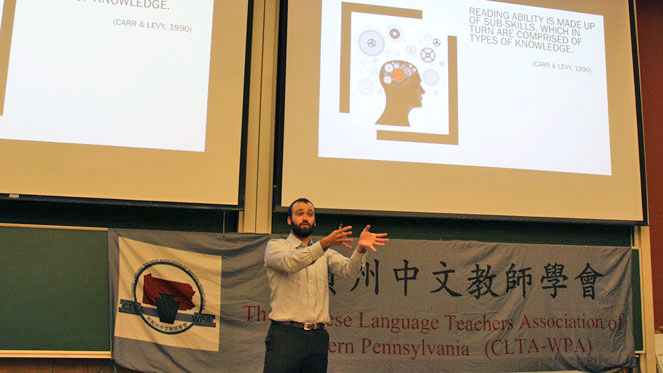Chinese Language Educators Gather at CMU to Share Ideas
By Emily Stimmel

Teachers in all disciplines are challenged to reach students in new and innovative ways, and Chinese language instructors are no exception. According to Carnegie Mellon University’s Sue-mei Wu, instructors must “learn from the learners” about tools and strategies that engage them, which may include apps, collaborative learning environments and other techniques.
Wu founded the Chinese Language Teachers Association of Western Pennsylvania (CLTA-WPA) to give Chinese language educators a forum to exchange ideas and best practices. This fall, over 110 teachers came to CMU to do just that at the fifth biannual CLTA-WPA Foreign Language Teaching Symposium. Attendees represented nearly 40 K-12 schools, colleges and Sunday Chinese schools from the region.
Along with Wu, CMU professors Gang Liu and Yueming Yu helped organize the daylong event, which included professional development workshops, panel discussions and poster presentations on topics like Chinese culture instruction and technology-enhanced learning (TEL).
“Each year, we learn something new that can be used in our own classrooms,” said Liu, associate teaching professor of Chinese Studies.
CMU’s Department of Modern Languages showcased its strengths in TEL and interdisciplinary collaboration through exhibits of Open Learning Initiative (OLI) courses like French Online and Chinese Online. Participants also learned about using technology to track student learning outcomes and engaging students through film, visual aids and mobile platforms.
For the first time, three graduate students in the Applied Second Language Acquisition program conducted teaching demonstrations at the symposium. Brandon Cheng, Yiting Han and Difan Zhou each facilitated a sample lesson around one facet of language teaching.
Cheng appreciated the opportunity to present – his first time doing so at a conference.
“My teaching demo was aimed at demystifying Chinese characters – taking the fear out of looking at a mass of squiggles and slashes and trying to make sense of it all,” said Cheng. “I attempted to show the inherent logic and beauty in the Chinese script, and argued a ‘building block’ approach to understanding Chinese grammar.”
According to Wu, president of CLTA-WPA, 15 instructors were non-native Chinese speakers – a marked shift from past years.
“The symposium provides a great channel for attendees to share strategies informed by their diverse backgrounds and teaching environments,” said Wu, teaching professor of Chinese Studies and director of the Masters in Applied Second Language Acquisition. “The non-native Chinese speaking teachers, for example, have experienced learning Chinese as a second language themselves, which gives them special insight into what learners may be experiencing.”
In addition to the Modern Languages Department and CLTA-WPA, the Confucius Institute at the University of Pittsburgh sponsored the event.